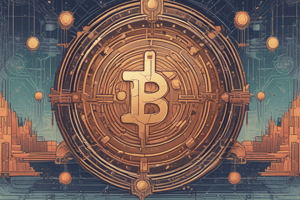Podcast
Questions and Answers
What is the primary advantage of decentralized finance over traditional financial systems?
What is the primary advantage of decentralized finance over traditional financial systems?
- Slower transaction processing times
- Greater accessibility and transparency (correct)
- Increased dependence on intermediaries
- Higher transaction fees
What is the key characteristic of a distributed ledger that ensures its security and tamper-proof nature?
What is the key characteristic of a distributed ledger that ensures its security and tamper-proof nature?
- Real-time updates
- Decentralized and maintained by multiple participants (correct)
- Centralized authority
- Monthly backups
What is the primary use of cryptography in cryptocurrencies?
What is the primary use of cryptography in cryptocurrencies?
- To facilitate faster transaction processing
- For security (correct)
- To promote decentralization
- To increase the value of the cryptocurrency
Which of the following industries is NOT a potential use case for blockchain technology?
Which of the following industries is NOT a potential use case for blockchain technology?
What is the primary difference between a decentralized ledger and a traditional ledger?
What is the primary difference between a decentralized ledger and a traditional ledger?
What is the primary function of a blockchain in a decentralized financial system?
What is the primary function of a blockchain in a decentralized financial system?
What is the key benefit of using blockchain in supply chain management?
What is the key benefit of using blockchain in supply chain management?
What is the primary characteristic of a public blockchain?
What is the primary characteristic of a public blockchain?
What is the role of miners in a blockchain network?
What is the role of miners in a blockchain network?
What is the primary advantage of using smart contracts in a decentralized system?
What is the primary advantage of using smart contracts in a decentralized system?
Flashcards are hidden until you start studying
Study Notes
Blockchain: A Comprehensive Guide to the Technology and its Subtopics
Blockchain, a decentralized digital ledger, has emerged as a transformative technology in recent years. It provides a secure and transparent way to record transactions on a distributed network, eliminating the need for intermediaries. This technology has the potential to revolutionize various industries, from finance to supply chain management. In this article, we will delve into the world of blockchain, exploring its components, types, functioning, and use cases.
Decentralized Finance
Decentralized finance (DeFi) is a financial system built on blockchain technology. It allows users to perform financial transactions without intermediaries, such as banks. DeFi applications include lending, borrowing, trading, and more. The decentralized nature of DeFi makes it more accessible and transparent than traditional financial systems.
Distributed Ledger
A distributed ledger is a database that is decentralized and maintained by multiple participants. Each participant has a copy of the ledger, which is updated in real-time. This ensures that the ledger is secure and tamper-proof. The distributed nature of the ledger eliminates the need for a central authority, providing a more secure and efficient way to record transactions.
Cryptocurrencies
Cryptocurrencies are digital currencies that use cryptography for security. The most well-known cryptocurrency is Bitcoin. Cryptocurrencies operate on a blockchain, which is a distributed ledger. Transactions are verified by network participants, ensuring their authenticity and security.
Smart Contracts
Smart contracts are self-executing contracts with the terms of the agreement between buyer and seller being directly written into lines of code. The code and the agreements contained therein exist on the blockchain network. Smart contracts facilitate, verify, and enforce the negotiation or performance of a contract. They can be programmed to automatically execute transactions when predefined conditions are met, thereby eliminating the need for intermediaries and reducing transaction costs.
Supply Chain Management
Blockchain technology can be used in supply chain management to create a transparent and secure system for tracking products. Each transaction is recorded on the blockchain, providing a tamper-proof record of the product's journey from manufacture to delivery. This can help prevent counterfeit products and improve efficiency in the supply chain.
Blockchain Types
There are two main types of blockchain: public and private. Public blockchains, like Bitcoin and Ethereum, are open to anyone and allow anyone to participate in the network. Private blockchains, on the other hand, are restricted to a specific group of participants, often within an organization.
Functioning
Blockchain works by creating a chain of blocks, each containing a set of transactions. When a new transaction occurs, it is added to a block and broadcast to the network. Network participants, known as miners, use complex mathematical algorithms to validate the transaction. The first miner to solve the algorithm gets a reward in the form of cryptocurrency.
Use Cases
Blockchain has a wide range of potential use cases, including:
- Healthcare: Blockchain can be used to store and share patient data securely and transparently.
- Finance: Blockchain can be used to create a more efficient and secure financial system.
- Supply Chain: Blockchain can be used to create a transparent and secure supply chain management system.
- Real Estate: Blockchain can be used to create a more efficient and secure system for buying and selling property.
In conclusion, blockchain is a transformative technology with a wide range of applications. It provides a secure and transparent way to record transactions, eliminating the need for intermediaries. The technology has the potential to revolutionize various industries, from finance to supply chain management. As the technology continues to evolve, we can expect to see it used in a wide range of applications.
Studying That Suits You
Use AI to generate personalized quizzes and flashcards to suit your learning preferences.




